Soundwalk Program Notes
Interactive Map
Click on the info bubbles to see where each track will be!
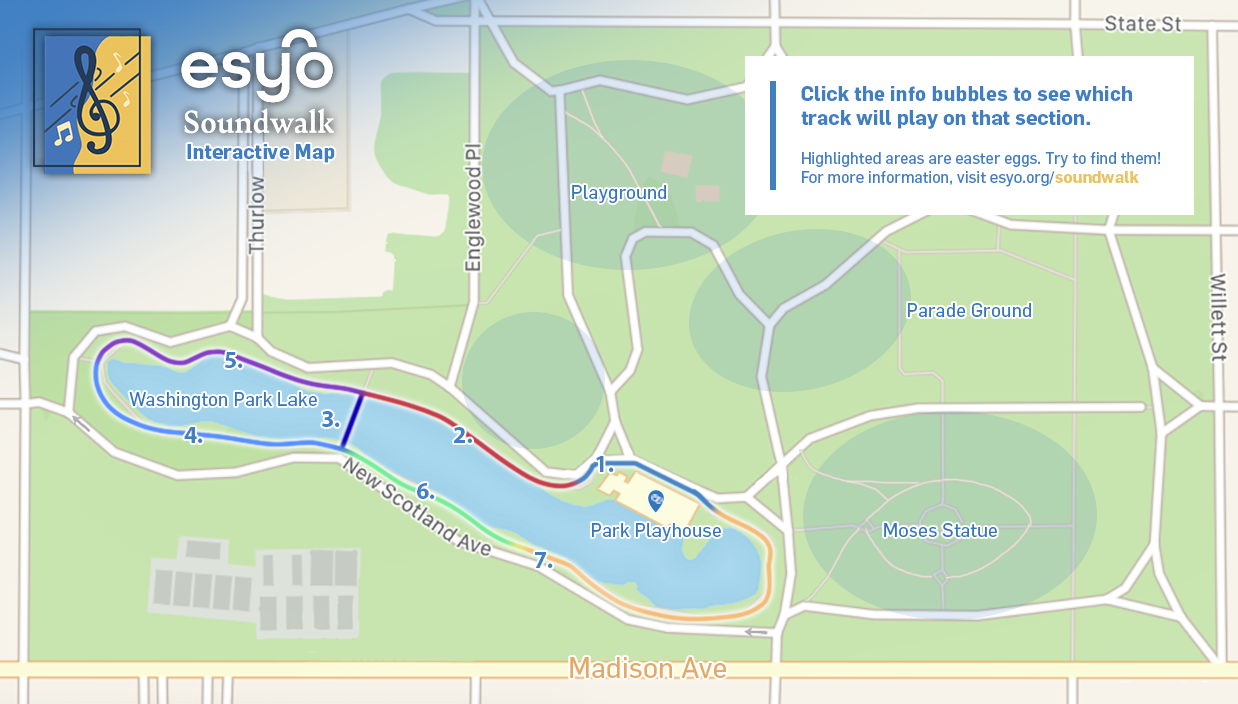
1. Soundwalk Welcome / "Thrumming"
By Michael Blostein
We are excited to welcome you to the Soundwalk! This work is designed to reproduce the sense of energy and excitement we have for this project, and hopefully inspire you, the listener, to delve deeper into the various ways we can interact with nature, and our contributions to the landscape around us. We’re excited you are here, and hope you find as much inspiration from this enterprise as we do!
2. "Oh Long Desired Day/Water Song"
By Brett L. Wery
3. "The Lark Ascending"
By Vaughn Williams
4. "Willow"
By Clare Criscione
5. "April Sketch"
By Jason Handron
6. "String Quartet in D major"
By William Lauricella
7. "Fort Orange Station"
By Matthew Kenyon
Special Shoutout to all of the wonderful ESYO youth musicians who came to Proctors on a weekend to rehearse and record all the music you hear in the Soundwalk. With just one 45 minute rehearsal on a Saturday, and one 45 minute recording session the next day on Sunday, they recorded all of the original compositions composed for the Soundwalk. Thank you for your hard work!
Abigail Beauregard - Bassoon
Abigail Edgar - Double Bass
Alyeene Zebrowski - Violin
Emma Edgar - Clarinet
Garrett Lamouree - Trombone
Georgia Burtt - Violin
Hanh Nguyen - Cello
Inari Sohn - Flute
Jared Lamson - Clarinet
Jason Handron - Double Bass
John Crowley - Violin
Julia Spretty - Clarinet
Karina Li - Violin
Mattew Kenyon - Viola
Michael Wong - Violin
Olivia Petti - Oboe
Peter Klisiwecz - Saxophone
Themba Pieterse - Trumpet
Trey Coughlin - Cello
Vincent Zhang - Cello
William Lauricella - Percussion
Yu-Heng Wang - Violin/Viola
Soundwalk Program Book
Tracklist with descriptions
By Mike Blostein
Meaning “Pulsing”, the constant underlying beat gives momentum to this work. With layered contrapuntal melodic lines, the rhythms and interplay of the instrumental voices helps to remind us how the various sounds and sights of nature intertwine in constantly changing ways, all while maintaining a constant hum to life.
This work was written in response to a general call (and immediate need) for flexible ensemble works in the midst of the Covid19 Global Pandemic. This work is designed to focus on elements of aleatoric music, and to allow for a virtual ensemble if so desired (with any instrumentation available).
By Brett Wery
The commission stipulates pieces inspired by Albany’s Dutch heritage. I wanted to also include a nod to the Native American peoples that lived in the area long before the Dutch settlers. The result is a trio for two clarinets—Emma and I are both clarinetists—and cello that combines the Dutch folk song, O dag o lang gewenste dag (Oh long desired day) and the Akwesasne Mohawk tune honoring the sustaining gift of water.
Vaughan Williams composed The Lark Ascending in 1914, in the early days of World War I, when a pastoral scene of a singing bird on the wing seemed far removed from reality. The war so occupied public attention that the premiere of The Lark Ascending was delayed seven years, until the violinist Marie Hall, for whom the piece had been written, gave the first performance of the orchestral version.
Vaughan Williams supplements the title’s image of a bird ascending skyward by prefacing the score with excerpts from the George Meredith poem that served as his inspiration:
He rises and begins to round,
He drops the silver chain of sound,
Of many links without a break,
In chirrup, whistle, slur and shake…
For singing till his heaven fills,
’Tis love of earth that he instils,
And ever winging up and up,
Our valley is his golden cup,
And he the wine which overflows
To lift us with him as he goes…
Till lost on his aërial rings
In light, and then the fancy sings.
Vaughan Williams’s The Lark Ascending is a gentle, introspective work. The solo violin flutters and soars, evoking the lark of Meredith’s poem. The winds and supporting strings float peacefully beneath the solo part in long and languid lines.
By Clare Criscione
“Willow” is a short piece based loosely on structural and melodic elements of various Eastern Woodland Native American musical traditions. The title alludes to the Willow tree which sits in this section of the path in Washington Park. The piece begins with a unison melodic “call” over a held “G” tone, played in octaves. This opening serves to call attention to listeners before entering the more subtle call-and-response section. In the 6-instrument arrangement, the first violin, first viola, and first cello generally serve as the “call” voices, while the second violin, second viola, and second cello serve as the “responses”. Initially, these figures resemble bird song, gradually creating a layered atmosphere of calls and responses. After building for some time, the cellos enter over the figure with short 3 and 4-note melodies. The rest of the ensemble slowly begins to take on this figure as well. In the latter third of the piece, listeners are again brought to attention with the same “call” from the very beginning. Following this second “call”, the voices slowly build together through a repeated melody (the tree’s theme) in three-quarter time to the end.
By Jason Handron
While walking through the park, one might attune themselves to extraneous sounds around them. Birds chirping, cars driving by in the distance, a gust of wind blowing past your ears; these sounds are as much a part of a nature walk as the act of walking itself. In this work for two double basses, April Sketch seeks to compliment these ambient noises with the earthy but delicate tone of the double bass and the rich natural harmonics it possesses.
By William Lauricella
This composition written for the soundwalk is the second movement of a string quartet I have been working on for the past couple of months. It is a lively waltz movement, inspired by music from the late classical period. It begins with a bold and strong A section, and makes it way into the contrasting B section, which features an expansive melody from the cello. The inspiration to start a project written for string quartet came from an interest to one day write a piece for full symphony orchestra, something that takes an extensive knowledge of the blending of instrumentation.
By Matthew Kenyon
This piece uses the timbre of each instrument along with rhythm to sound like a train. The beginning starts off with you arriving at the station. The key change is when the train starts moving. After that, you see the view from the train window as you travel to your destination. Finally, the train comes to a stop and arrives back in the key of F major and the train station.
Recorded and Produced by the Musicians of Ma’alwyck
By Aaron Houston
In July of 1518, a woman began to dance wildly in the streets of Strasbourg for several days. Within a week, her contagious movement had infected others and as many as 30 people were feverishly fox-trotting non-stop. Eventually, around 400 people in an area of the Holy Roman Empire (that is now modern day France) moved and grooved for a month without stopping for rest. Some of those involved quite literally danced themselves to death from exhaustion. There are many theories about what was behind the “Dancing Plague of 1518,” but nobody is really sure what caused the outbreak or why it lasted for as long as it did. In an effort to cure this strange disease, authorities and clergy declared there should be even more dancing! They opened guildhalls, built stages for the maniacal mambos, and paid musicians to perform around the clock so people could continue dancing ceaselessly night and day. However, this only led the pestilent dancing to spread even more rapidly and affect a greater number of people. A Most Peculiar Dance plays out this twisted tango with winding, playful melodies and the jagged, uneven rhythms of bodies moving awkwardly as they attempt to shake off their fevered disease. The music is energetic, lively, and playful, but – like in 1518 – this Peculiar Dance ultimately proves to be a dance most bizarre.
By Monica Roach
Power and the unknown possessed by the Ocean Deity are the pillars of this piece. The strength and fierce mystery of the seas are felt throughout. The intense nature of the tremolos musically state an unclear but strong influence felt by the listener. The strings convey the feeling of the waters waving and cresting against the shores. We do get a break from the intensity mid-way through for a short while as displayed by the shift from a minor key to a major key. The cello lays the foundation as the violins often ride the waves. The viola brings the mid-range intensity throughout and is the glue that keeps it all together. After the happy exchanges finish, the music brings the hint of intensity brewing. The clouds thicken and the storm begins again. Theoretically, the listener may imagine standing on a cliff viewing the stormy sea, gallantly poised for the emergence of the Ocean Deity.
Music and libretto by Max Caplan
Commissioned and produced by the Musicians of Ma'alwyck
Set in Staten Island in 1916, Aleda tells the true story of a unique women’s suffrage demonstration attempted by female pilot Leda Richberg-Hornsby and the National American Woman Suffrage Association. Equipped with a bi-plane, a cargo of votes-for-women petitions, and a huge banner reading “Women want liberty, too,” their goal was to fly over New York Harbor during a national celebration at the Statue of Liberty in order to “bomb” President Woodrow Wilson with petitions. Although the plan unfortunately failed, as gale-force winds necessitated a premature crash-landing in a Staten Island swamp (luckily no one was hurt), the attempt still stands as a testimony to the courage and inventiveness – not to mention dramatic flair – of these women in their struggle for the ballot.
Our Composers
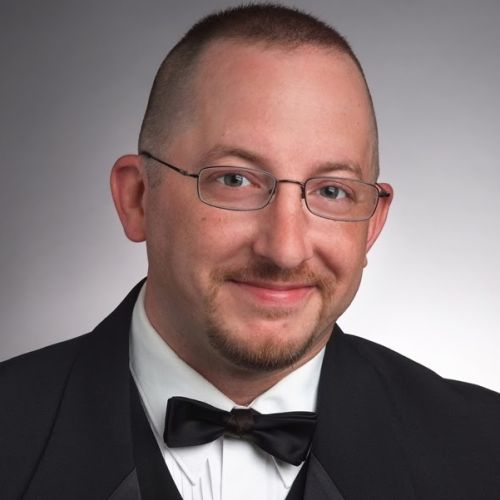
Mike Blostein
"Thrumming" AND "Soundwalk Welcome"
Michael D. Blostein has taught orchestra in Averill Park High School for the last 21 years, as well as band since 2012. In addition to his teaching duties, he serves as co-conductor of the Delmar Community Orchestra, runs sectionals for ESYO, is an active low brass performer and maintains a private studio. His education includes a Bachelor's degree in Music Education from the Crane School of Music at SUNY Potsdam and a Master's degree in Composition from the University of Arizona. Further studies have been undertaken at Villanova University (through the University of the Arts), as well as The Juilliard School and UMass Amhearst. He has been included as a contributing writer in the All-Music Guide and the All-Music Guide to Classical Music, has works performed throughout the country, and has music listed on college audition repertoire lists and the NYSSMA manual, among others
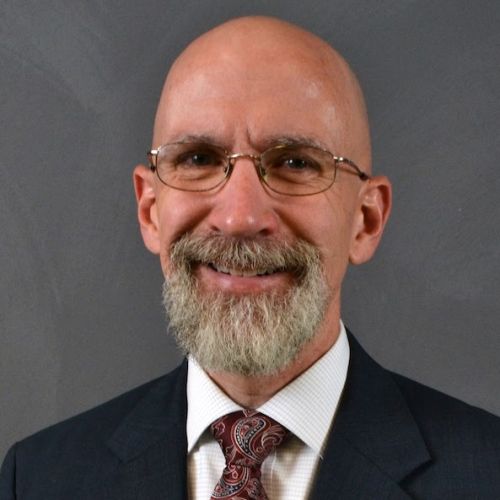
Brett Wery
"Oh Long Desired Day/Water Song"
Brett L. Wery is an active composer/arranger in the Capital Region area of upstate New York. For twenty-five years he taught theory, conducting, and applied woodwind studies at the State University of New York, Schenectady County Community College where he also directed the college wind ensemble. As a professor at SUNY Schenectady, Wery has been the recipient of the SUNY Chancellor’s Award for Excellence in Teaching, the SUNY Chancellor’s Award for Excellence in Scholarship and Creative Activities, and the SCCC Foundation Award for Excellence in Teaching. Wery later served as dean of the School of Music at SUNY Schenectady before retiring from academia to pursue composition full time. He is also the Music Director/Conductor of the Capital Region Wind Ensemble in Schenectady, NY—a group of professional musicians that has premiered many of Wery’s works for wind ensemble and band.
An award winning member of ASCAP and SCI, Wery’s compositions have been performed and recorded around the world and include Sonata for Guitar Quartet, Dance Variations for Woodwind Quintet, Oot-kwa-tah for chamber orchestra, Four World Variants for Clarinet Quartet, and Sonata for Multiple Woodwinds and Piano. In addition to composing and conducting, Wery is an active woodwind doubler—performing on flute, clarinet, and saxophone.
Mr. Wery received his bachelor’s degree at the North Carolina School of the Arts and his Master’s Degree at the University of Denver.
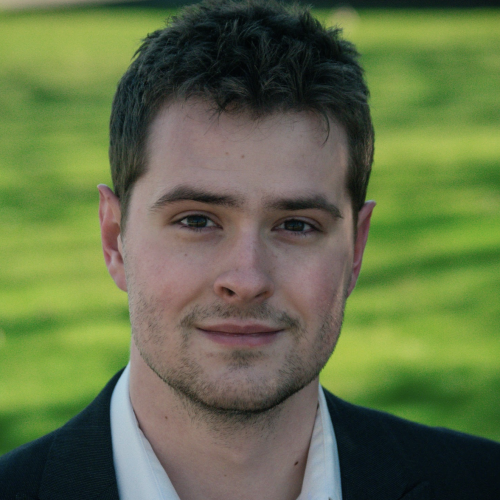
Jason Handron
"April Sketch"
Jason Handron (b.1995) is a composer and bassist from Albany, NY.
He has been featured as both a composer and performer at events such as the 2017 soundSCAPE Festival (Maccagno, Italy) and the 2018 New Music Gathering (Boston, MA). He is a co-founder and member of the chamber band Drive(J:), a flexible quartet specializing in unconventional performance.
Jason holds a B.M. in music composition from the State University of New York at Fredonia and an M.M. in music composition from Bowling Green State University. His primary teachers include Karl Boelter, Paul Coleman, Mikel Kuehn, and Marilyn Shrude.
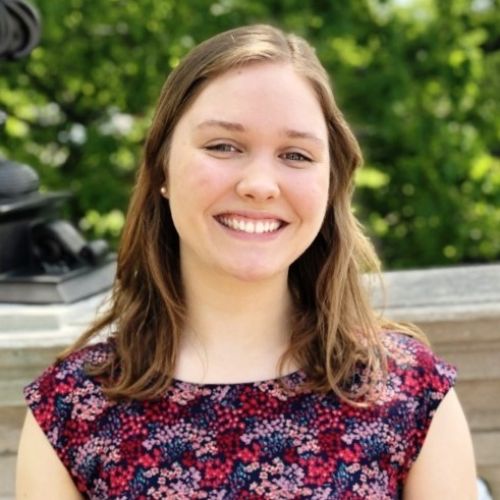
June/Clare Criscione
"Willow"
Clare Criscione was a violinist in ESYO for 10 years. As a member of the Symphony Orchestra from 2009-2015, she often served as co-concertmaster and received first place in the organization’s Lois Lyman Concerto Competition in 2013. For her entire middle and high school years, Tuesday night was always ESYO night! Clare is also an alumnus of Harvard College, where she was a member of the Brattle Street Chamber Players and the Harvard-Radcliffe Orchestra. As a senior at Harvard, Clare took her first class in composition and had the privilege of having several original works performed by the Parker Quartet. Alongside her music endeavors, Clare was deeply involved in education and service at Harvard while completing pre-med requirements. Clare plans to begin medical school this summer and knows music will remain a huge part of her life as she continues to advocate for music education and write her own works.
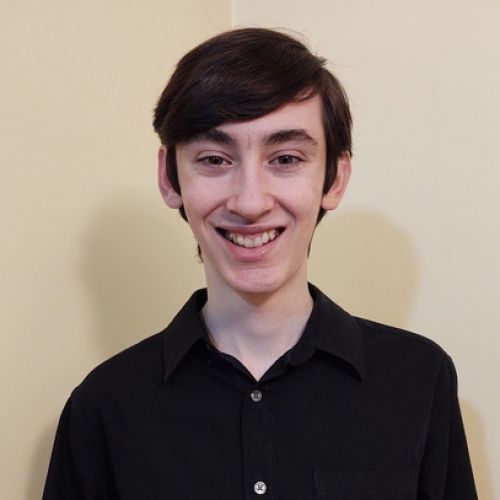
Matthew Kenyon
"Fort Orange Station"
Matthew Kenyon, age 16. Scotia-Glenville High School. I play viola, alto sax, and keyboard. I’m currently part of ESYO’s Repertory Orchestra. My love for music started when I was 3 and my great-grandfather played the harmonica at a family gathering. I loved it so much that he bought me a toy harmonica to play and I would play for him on his birthday. I want to be a composer and a performer. You can check out my YouTube channel here.
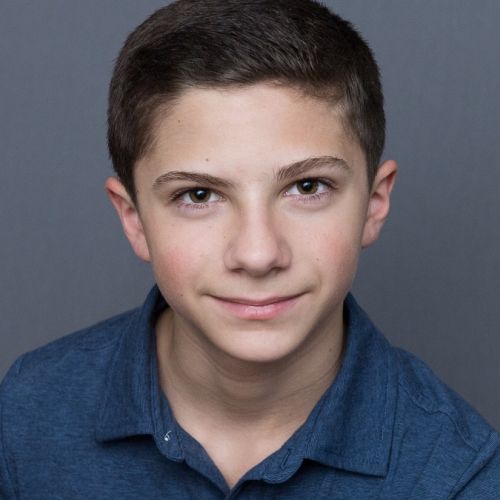
William Lauricella
"String Quartet in D major"
William Lauricella is a 15 year old pianist, percussionist and composer with the Empire State Youth Orchestra’s Symphony Orchestra and Youth Percussion Ensemble. Being a member of ESYO the past 4 years has helped William grow as a musician and person by allowing him to work with outstanding conductors and musicians.
In 2020, William won first place in the ESYO Lois Lyman Concerto Competition. In July of 2019, William won the Luzerne Music Center Concerto Competition. William placed second in the 2019 Leschetizky International Concerto Competition and the 2019 CDCYM Chopin Competition. William was featured as the WMHT Classical Student of the month in June of 2019. In 2018, William won first place in the Schenectady Symphony Louise DeFeo Parillo Concerto Competition and the Tchaikovsky Music Competition at the New Russia Cultural Center.
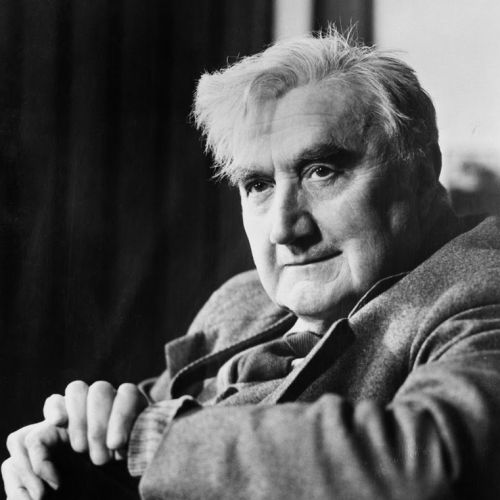
Vaughan Williams
"The Lark Ascending"
Ralph Vaughan Williams, 12 October 1872 – 26 August 1958) was an English composer. His works include operas, ballets, chamber music, secular and religious vocal pieces and orchestral compositions including nine symphonies, written over sixty years. Strongly influenced by Tudor music and English folk-song, his output marked a decisive break in British music from its German-dominated style of the 19th century.
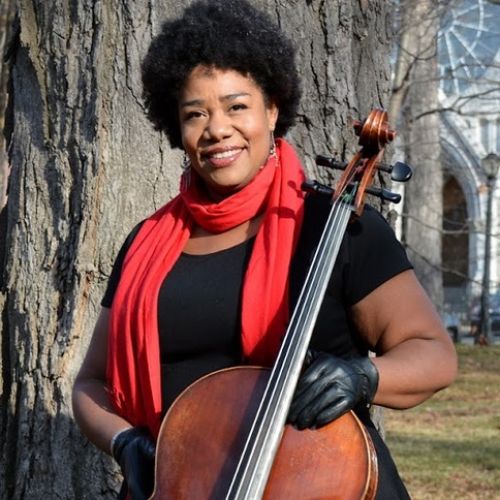
Monica Roach
"Ocean Deity" - Easter Egg 1
Monica Wilson-Roach has been playing cello and bass for over thirty-five years. She was on faculty at the Juilliard School and has performed in the Texaco New York Jazz Festival, the Documenta X in Kessel, Germany, the Jazz and Bluesfest – Live from Wolftrap, and the Brooklyn Academy of Music performances of Donald Byrd's Jazztrain with Grammy Award winning artist, Vernon Reid. She has also written and recorded string arrangements for films including "Free Angela Davis and All Political Prisoners", "The Main", and "Though A Lens Darkly", featured at Sundance and recipient of the NAACP award. Ms. Wilson-Roach was a featured speaker on the WMHT program "WMHT Talks Education Special" in addition to her band, TEN27, performing pieces from their multimedia concert “The Black Book Project” live on the show. Most recently, she was commissioned to compose a three (3) movement
piece for The Northeast Ballet Company’s new dance suite “The Beach”. Monica has performed at Carnegie Hall, the Knitting Factory, Merkin Hall, Troy Savings Bank Music Hall, Alice Tully Hall, Lincoln Center out-of-doors, and The Egg at the Center for the Performing Arts. Currently, she conducts the Empire State Youth Orchestra CHIME in School educational outreach program, TuttiCelli cello choirs, and the Macedonia Chamber Orchestra. In addition to recording on over 25 CD’s for various artists, she has also performed with the Lawrence Butch Morris Conduction Project, the Trans-Siberian Orchestra, Albany Symphony Orchestra, and the Glens Falls Symphony Orchestra.
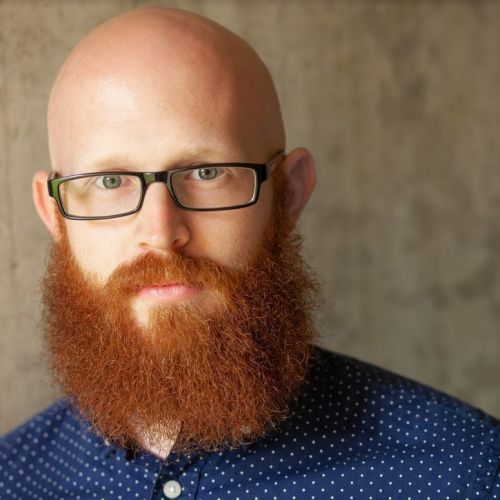
Aaron Houston
"A Most Peculiar Dance" - Easter Egg 2
Aaron Houston (b. 1991) composes music that lives where the energetic soul of rock, folk music, and more collides with his classical training in unexpected ways to create what Ellen Taaffe Zwilich has labeled a “strong voice in composition” and reviews have said “[feels] alive and tangible to the audience” (Emily McCarthy, Tallahassee Democrat).
Upcoming projects include a new work for brass quintet commissioned by a consortium of ensembles including Baylor Brass, Braeburn Brass, and Big Bend Brass; a composition for solo bassoon commissioned by Ryan Reynolds of Akropolis Reed Quintet and a consortium of 12 performers to explore and exhibit the variety of personalities and characteristics available to the bassoon and its performers; and a forthcoming work for percussion ensemble written in collaboration with Sam Houston High School in Arlington, Texas. His recent work, Midway to Midtown, merges the influences of Texas Blues legend Stevie Ray Vaughan with “brilliant orchestration” (George Tsontakis) and was premiered by David Alan Miller and the Albany Symphony Orchestra. Inspired by the idea of storytelling, this work blends Aaron's background as a Texas Blues guitarist with a developed craft and contrapuntal writing. Other recent projects include Katabasis − a virtuosic work for solo cello commissioned by Holden Bitner as a descent into the wild, natural landscape of Florida; Americana Soul − a work for unaccompanied viola featuring the sounds of American folk music that was premiered by Brian Bires as an encore with the Gewandhaus Akademisches Orchester in Leipzig, Germany; and Along Fault Lines − commissioned by Jillian Storey for flute and live electronics, this work serves as a response to the growing violence and divide in America during 2020 that came to the forefront due to a global pandemic and the untimely deaths of George Floyd and many others at the hands of police.
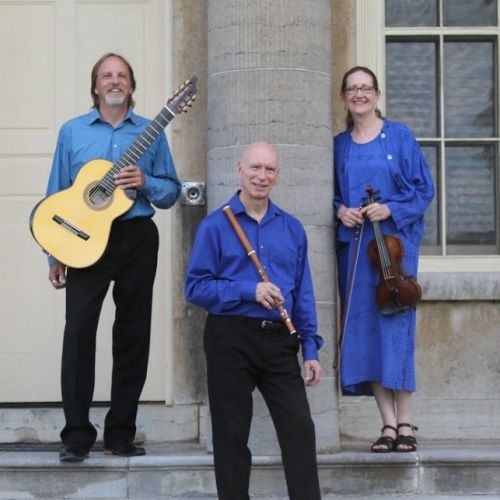
Musicians of Ma'alwyck
"ALEDA: THE FLIGHT OF THE SUFF BIRDWOMEN" and "Galop" Both Recorded by the musicians of Ma'alwyck - EASTER EGGs 3 and 4
Musicians of Ma’alwyck is a flexible-size chamber ensemble in residence at the Schuyler Mansion New York State Historic Site and Schenectady County Community College. Founded in 1999 by violinist and director Ann-Marie Barker Schwartz, the group specializes in music performed in America during the eighteenth and nineteenth centuries. Many of the performing materials are drawn from the Special Collections of the New York State Library. In 2002, Musicians of Ma’alwyck performed by invitation for television producer Norman Lear in celebration of his purchase of the last private copy of the Declaration of Independence. Musicians of Ma’alwyck has been presented on National Public Radio, WMHT-FM and WMHT-TV. In 2009 the ensemble produced the 1783 opera The Poor Soldier by William Shield, drawing national attention. Musicians of Ma’alwyck was named the best chamber music ensemble of the Capital Region for both 2008 and 2009 by Metroland. In the spring of 2019 and 2020 Musicians of Ma’alwyck was nominated for an Eddie Regional Music Award.
